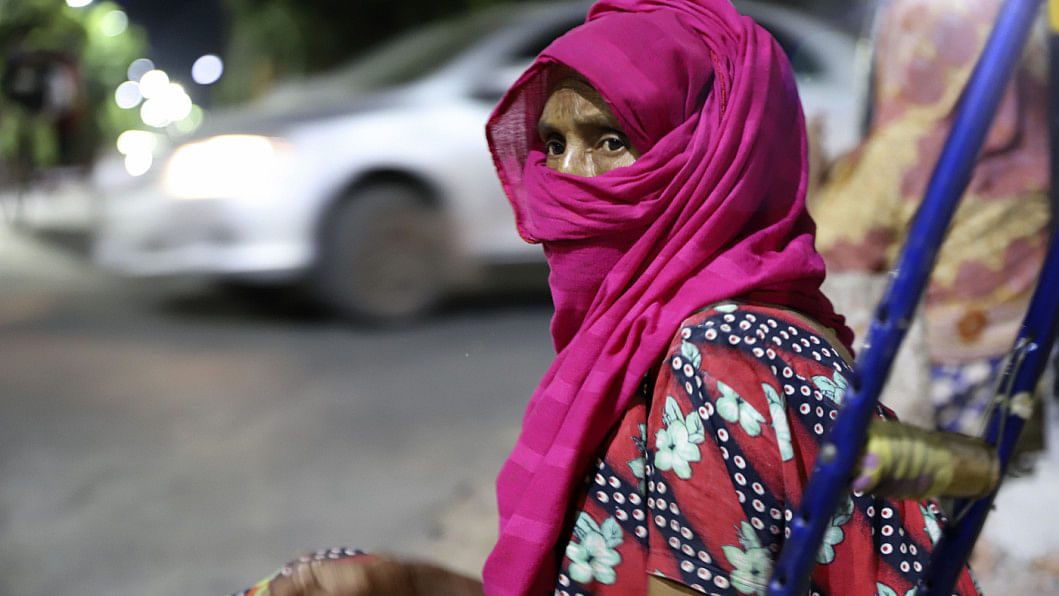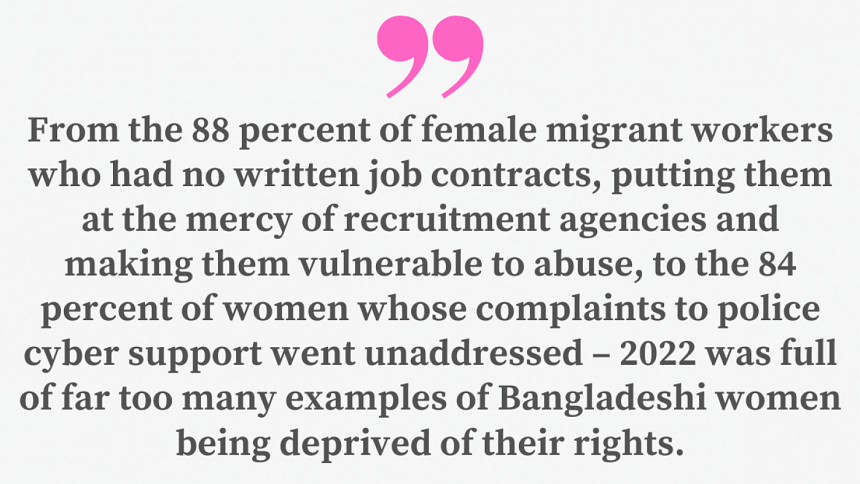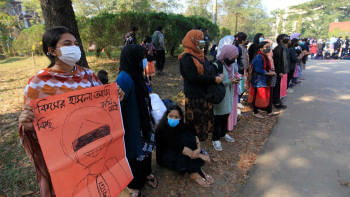How did Bangladeshi women fare in 2022?

For a country in the grips of an epidemic of sexual violence, and which has witnessed mass protests demanding an end to impunity for rapists – the amendment of the Evidence Act, 1872 was perhaps the year's most important event in terms of gender justice.
For decades, women's rights activists had campaigned against the crass and demeaning questions asked during cross-examination to find evidence of the rape survivor's "immoral character" – including questions about sexual history – arguing that it causes intense psychological trauma and deters women from speaking out about their abuse. The repeal of Section 155(4), which allowed this practice, is thus a historic moment. However, activists are continuing to campaign for the removal of Section 146(3), which allows questions that may "injure the character of the witness in order to verify their credibility."
The amendment of the Labour Rules, 2015 is another milestone; the most significant being the new rule against sexual harassment in the workplace, which clearly defines sexual harassment, and imposes a duty on employers to implement a process of complaint and redress.
Unfortunately, when it comes to women's rights, we so often take one step forward, only to take another step back. In this case, it has been argued that the new method of calculating maternity benefits may actually reduce them, although the provision to give leave for miscarriages has been widely appreciated.
The High Court this year also asked some key questions regarding the unconstitutional nature of gender inequalities in the law, such as the customary law that deprives Hindu females of inheriting their deceased father's properties. However, it's interesting that it did not ask similar questions about the gendered inequalities in other religious personal laws, although it did question why the Muslim Marriage and Divorce Rules, 2009 says that only the sons of marriage registrars (kazi) can become a kazi.
Unfortunately, in terms of macro-changes, this is where the positives end, and 2022 has, predictably, been a violent year. According to Ain O Salish Kendra (ASK), 886 cases of rape were reported till November, and the real number is likely to be far higher.

Media reports point to a disturbing trend of not only gangs and miscreants committing violence, but teachers, cousins, classmates, colleagues and family friends being perpetrators too. There were also 236 known cases of domestic violence, with abusers ranging from truck drivers and policemen to actors and ex-state ministers.
This corroborates the well-known fact that women are equally vulnerable in private spaces, even though there is a common perception that public spaces are more unsafe. Having said that, a survey found that 36 percent of over 5,000 respondents faced sexual harassment regularly on public transport, and nearly 87 percent faced some form of harassment at least once in their lives – an issue that remains largely unaddressed.
It was disturbing to find just how many perpetrators occupied positions of power, including in law enforcement agencies. This was epitomised in June, when a 15-year-old girl appeared in front of the High Court bench with the simple plea: "Sir, I have been raped. We have no money for moving the case. I want justice from you… I have been raped by a member of the BGB. The lower court in Nilphamari has acquitted the offender."
There were even instances where women faced more abuse while trying to access justice. In January, a girl was found dead in the victim support centre of Kotwali Police Station in Rangpur. In March, a woman suffered a miscarriage after being assaulted at Kashimpur Police Station in Gazipur. And in May, this daily investigated a policeman who reportedly raped a victim of harassment, and then continued to harass her himself.
That abuse of power has become part and parcel of gender-based violence became clearer during the year's student movements. A group of alleged BCL men attacked students of Bangabandhu Sheikh Mujibur Rahman Science and Technology University (BSMRSTU) in January while they protested their classmate's gang-rape. At Chittagong University, a sexual assault survivor's friends reported of threats from several BCL men after organising protests.
During the Shahjalal University of Science and Technology (SUST) protests in January, which started as a women-led movement for an improved campus environment, university authorities used police force to suppress legitimate protests. And the VC's sexist comments – on how no one wants to marry women who roam around at night – reflected the misogyny in our society, and how women's rights continue to be trivialised by those in power.
From the 88 percent of female migrant workers who had no written job contracts, putting them at the mercy of recruitment agencies and making them vulnerable to abuse, to the 84 percent of women whose complaints to police cyber support went unaddressed – 2022 was full of far too many examples of Bangladeshi women being deprived of their rights.
Even when an issue affected a specific population, women faced greater disadvantages, whether it's coastal communities bearing the brunt of climate change, tea workers from minority communities fighting for a living wage, or households struggling with the cost of living crisis. The rising rates of child marriage and adolescent pregnancy post-pandemic is testament to how women continue to be disproportionately affected during times of turmoil.
Against this bleak backdrop, it is amazing to see what Bangladeshi women can still achieve when exercising their agency. Bangladeshi women worked on the James Webb Space Telescope, received recognition for working in genome sequencing, operated the country's first ever metro, and became pioneers in climate-resilient farming. The women's football team made history by winning the SAFF Championships (although even here, the Bangladesh Football Federation failed to treat them with any respect).
At the beginning of the year, 12-year-old Poly Khatun and 15-year-old Mim Akhter, inhabitants of Mirpur's informal settlements, defeated internationally rated chess players after only three months of training.
Now that the year is ending, we must ask, how many more Polys and Mims are out there, deprived of living their fullest lives, because we have failed to correct even the most blatant gender inequalities in the country?
Shuprova Tasneem is a member of the editorial team at The Daily Star. Her Twitter handle is @shuprovatasneem

 For all latest news, follow The Daily Star's Google News channel.
For all latest news, follow The Daily Star's Google News channel. 








Comments